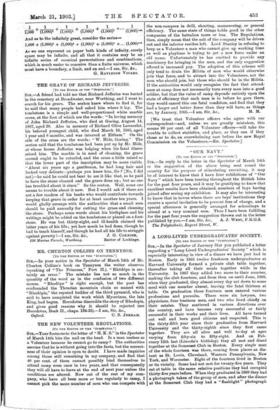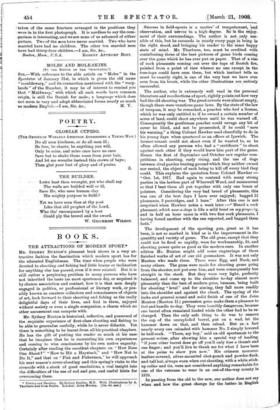A LONG-LIVED UNDERGRADUATES ' SOCIETY. [TO THE EDITOR. or THE "SPECTATOR. ")
Sxn,—In the Spectator of January 31st you published a letter regarding a "Long-Lived Undergraduates' Society" which is especially interesting in view of a dinner we have just had in Boston. Early in 1865 twelve freshmen undergraduates at Harvard University formed a private club table together, thereafter taking all their meals together while in the University. In 1867 they added two more to their number, making the club fourteen, and from then on until June, 1868, when they graduated, they almost every day sat down to some meal with one member absent, leaving the fatal thirteen at table. On graduation these fourteen men entered various professions and pursuits. There were six lawyers, two physicians, four business men, and two who lived chiefly on their estates. They scattered in various directions over the country, and have become very successful or fairly successful in their works and their lives. All have turned out well and been good citizens and respected. This is the thirty-fifth year since their graduation from Harvard University and the thirty-eighth since they first came together. They are all alive and well to-day at ages varying from fifty-six to fifty-eight. And on Feb- ruary 12th last (Lincoln's birthday) they all met and dined together at the Somerset Club in Boston. Every single man of the whole fourteen was there, coming from places as dis- tant as St. Louis, Cleveland, Western Pennsylvania, New York, and Worcester. Eight of the fourteen lived in Boston or its vicinity. Some had not met for twenty-five years. They sat at table in the same relative positions they had occupied thirty-five years before. When they graduated in 1868 they had a-photograph taken of the group of men, and after the dinner at the Somerset Club they had a " flashlight " photograph ' taken of the same fourteen arranged in the positions they . were in in the first photograph. It is needless to say the com- ,parison is interesting, and we are none of us ashamed of either picture. Two of the nen have never married. Two who have married have had no children. The other ten married men have had thirty-four children.—I am, Sir, &c.,











































 Previous page
Previous page